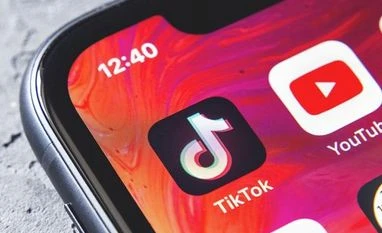Nupoff credits much of the song’s success in Asia to TikTok, a social video app that allows users to record and share short clips of pranks, dance routines, and skits set to music. The song took off in South Korea after the 1Million Dance Studio troupe recorded a video set to the song, which other users replicated in their own videos. It went viral in China after a player of the video game PlayerUnknown’s Battlegrounds uploaded a film combining gunshots of a weapon from the game with HandClap to Douyin, TikTok’s China-only equivalent. “It was just fans listening to the song, posting videos, and doing dances in their homes,” Nupoff says.
TikTok and Douyin, both owned by the Chinese startup Bytedance, are propelling songs from obscurity to ubiquity overnight, rewriting the path to stardom for some acts. While Fitz and the Tantrums had already experienced success at home, the burst of fame on TikTok persuaded the band to focus on Asia as it rolls out its new album.
The list of acts that owe sudden success to TikTok grows by the day. Lil Nas X just scored a No.1 song on the Billboard charts—and a record deal—after his song Old Town Road went viral on TikTok. And Supa Dupa Humble, a producer from Brooklyn, doubled his daily streams. “If you can get a song on Douyin, you suddenly get a viral impact,” says Simon Robson, the head of Warner Music’s Asian operations.
Musicians first met TikTok as musical.ly, a lip-syncing app founded in California and Shanghai in 2014 that had amassed more than ten million daily users—mostly teens—by the middle of 2016. Music writers labeled it the new Vine, the now defunct short-form video app owned by Twitter. Bytedance, which also operates one of China’s most popular news apps, saw enough potential in short music-enhanced video that it created its own service, Douyin, later that year. Douyin attracted 100 million users in less than 12 months; a separate app, TikTok, was created for outside the mainland.
Bytedance swooped in to acquire Musical.ly in November 2017 and folded it into TikTok, centralising the pranks—and the music licensing—under one company. The app’s popularity has since surged. TikTok has been downloaded more than 1 billion times worldwide, and is available in more than 150 markets. It was the most downloaded free app in the world for a time last year.
The app’s sudden rise caught record labels off-guard and revived an old debate in the music industry: Is this new internet service giving artists free promotion, or simply getting rich off their work? Record labels have resisted hundreds of companies, including MTV and YouTube, that wanted to offer music for free and pay little in return. As paid streaming services Spotify and Apple Music have revived record sales in recent years, labels have tried to squelch any app that offers music for free.
TikTok, however, presented a new way to promote songs. Unlike YouTube, which features full songs, TikTok lets its users include only snippets of music in their 15-second clips. So record labels licensed TikTok the rights to music for a flat fee of only tens of millions of dollars, comparable to what record labels get from Spotify each week, to test what would happen. The growth of TikTok and the news app Toutiao has boosted the valuation of Bytedance to about $75 billion, making it one of the world’s most-valuable startups. That rankles the music labels, which are still being paid under the original low-priced deal. “When I left [last year], the industry said these deals are not going to work anymore,” says John Bolton, a music executive who helped Bytedance strike its previous deals with music companies. “It sounds like that still has not been figured out.”
Labels are now asking Bytedance for hundreds of millions of dollars in guaranteed licensing payments, and they’ve threatened to pull their music from the app’s library if they aren’t rewarded.
TikTok would be rather boring without music, says Yang Lu, the general manger of music for Bytedance, which is now planning its own paid music service. But he’s quick to add that the app has been beneficial to the music industry, by creating programs to support independent artists in China, Japan, and South Korea, and has teamed up with labels around the world to help promote releases. And there’s little question that Bytedance’s apps motivate music lovers: On any given day, as many as half the songs in the top 10 on Chinese music services have been made popular by TikTok or Douyin. “We are not a music promotion app,” Lu says. “But we did happen to have a huge impact on music promotion. We are a very positive force.”
Many artists agree. Supa Dupa Humble promoted his song Steppin on Instagram when he first released it in 2017. The popularity of songs on Bytedance’s TikTok app, downloaded more than 1 billion times worldwide, is pushing musical acts to shift their touring schedules toward Asia.
To read the full story, Subscribe Now at just Rs 249 a month
Already a subscriber? Log in
Subscribe To BS Premium
₹249
Renews automatically
₹1699₹1999
Opt for auto renewal and save Rs. 300 Renews automatically
₹1999
What you get on BS Premium?
-
Unlock 30+ premium stories daily hand-picked by our editors, across devices on browser and app.
-
Pick your 5 favourite companies, get a daily email with all news updates on them.
Full access to our intuitive epaper - clip, save, share articles from any device; newspaper archives from 2006.
Preferential invites to Business Standard events.
Curated newsletters on markets, personal finance, policy & politics, start-ups, technology, and more.
Need More Information - write to us at assist@bsmail.in
)